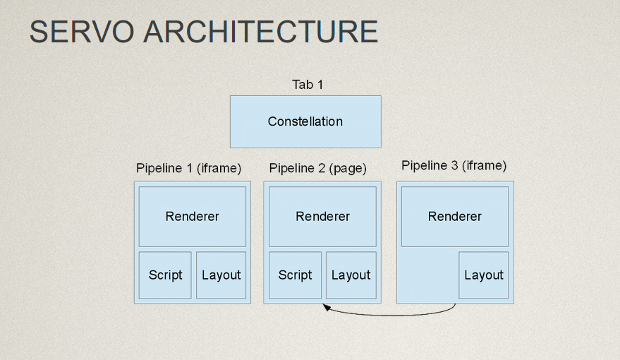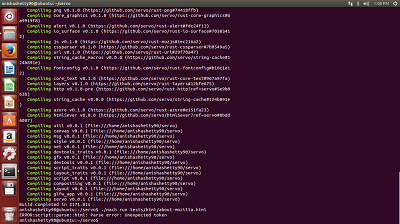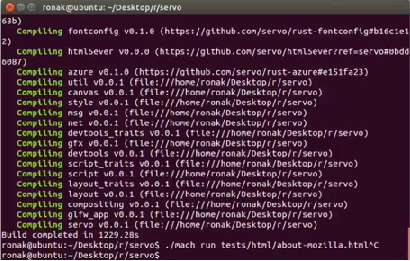CSC/ECE 517 Fall 2014/oss M1454 rss: Difference between revisions
No edit summary |
(→Step 1) |
||
| Line 20: | Line 20: | ||
= Implementation Steps = | = Implementation Steps = | ||
==='''Step 1'''=== | ==='''Step 1: Build Servo'''=== | ||
The first step includes building Servo. | The first step includes building Servo. | ||
Revision as of 13:38, 29 October 2014
Implementing proper JS error reporting
This wiki page contains the implementation of JS error reporting for the Mozilla project using RUST programming language.
Introduction
Mozilla is currently working on a research project called Servo<ref>http://en.wikipedia.org/wiki/Servo_(layout_engine)</ref><ref>http://www.zdnet.com/servo-inside-mozillas-mission-to-reinvent-the-web-browser-for-the-multi-core-age-7000026606/</ref>, which is a Web browser engine for a new generation of hardware: mobile devices, multi-core processors and high-performance GPUs. With the main goal of creating an architecture that is parallel at many levels, common sources of bugs and security vulnerabilities associated with incorrect memory management are thereby eliminated.
For the new browser Mozilla servo, SpiderMonkey<ref>https://developer.mozilla.org/en-US/docs/Mozilla/Projects/SpiderMonkey</ref> has been used as the JavaScript search engine. SpiderMonkey basically exposes a user-specifiable callback that executes JS and throws an exception that is not caught. SpiderMonkey has been written in C/C++. Initially, the library (which wraps the C-based mozjs aka SpiderMonkey) named rust-mozjs library sets this callback to a simple function that pushed the error logs on to the terminal.We need to replace this in Servo with an appropriate function which implements the error reporting specification for web browsers. Thus, as a part of our OSS project, based on the requirements, we have presented a way to replace this in Servo with an ErrorEvent interface which has methods that implements the error reporting specification for web browsers.
RUST Programming Language
Servo is written in RUST<ref>http://en.wikipedia.org/wiki/Rust_(programming_language)</ref> programming language which is developed by Mozilla research. It is memory safe thereby ensuring a high degree of assurance in the browser’s trusted computing base. RUST also guarantees concurrency thus avoiding the problem of ‘data races’ and ensures safety and speed. Rust’s lightweight task mechanism also allows fine-grained isolation between browser components.
Servo
Mozilla has planned to deliver its new browser Servo which facilitates great features like parallel processing in the browser in order to utilize many cores present in the modern mobile devices such as smartphones and tablets in order to carry out tasks concurrently. Even the giant and famous browsers like Chrome, Internet Explorer, Firefox, Safari, have tried to implement parallel processing via different ways such as aggregating the JIT (Just in Time)<ref>http://en.wikipedia.org/wiki/Just-in-time_compilation</ref> compilation technique to their JS engines. But, performance and security gains need re-modelling the browser stacks of these browsers. Servo, that is being designed to be compatible with the Android OS devices, will work with the Arm-based processors<ref>http://en.wikipedia.org/wiki/ARM_architecture</ref>.

Implementation Steps
Step 1: Build Servo
The first step includes building Servo.
Step 2
Once the Servo is built, the next step is to create an errorevent interface by adding a new WebIDL binding. The following are the steps to create a new WebIDL file:
- Create a new file 'ErrorEvent.webidl' and add it to components/script/dom/webidls.
- Create the 'errorevent.rs' file containing a Reflector at minimum, as well as implementation of the Reflectable trait and add it at the components/script/dom location.
- Add the implementation's module to the script crate lib.rs to ensure it is compiled.
- Build servo and fix any compile errors in the implementation.
Steps to execute our program
- The first step is to install Rust in your machine. Steps can be found at <ref>https://github.com/rust-lang/rust/wiki/Note-getting-started-developing-Rust</ref>
- The next step is to build Servo. Steps can be found at <ref>https://github.com/servo/servo</ref>
- Our implementation files are “errorevent.rs” and “errorevent.webidl”.
- Binding will be automatically generated. The binding file is “ErrorEventBinding.rs”
- Build servo again
./mach build
- We can now run the servo using the following command
./mach run tests/html/about-mozilla.html
Design Principles
- Simple: We have tried to not complicate the code but keep it simple.
- Readable: By adding necessary and required comments, we have made our code readable to other programmers.
- Reusable: We have tried and made our code capable of being used in a completely different setting.
- Efficient: Our code gives the results in reasonable amount of time.
Future work
References
<references />


